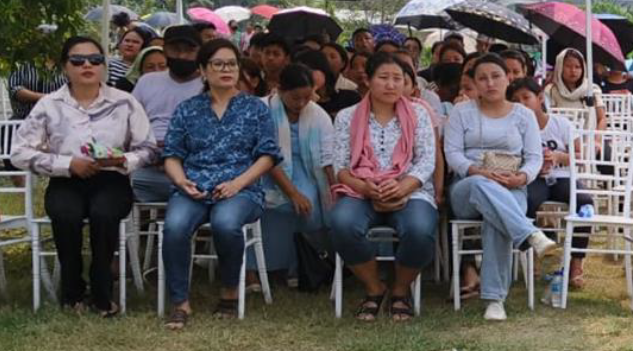Action For Implementation of RAMP In Association With NIDC (Nagaland Industrial Development Corporation Ltd)
A Synergistic Initiative by MARCOFED (The Nagaland State Co-operative Marketing & Consumers’ Federation Ltd.)
Content
- USHER-IN-Action RAMP
- NIDC & RAMP Programme Overview
- Introduction to MARCOFED
- MARCOFED-Competencies for
- RAMP Implementation
- RAMP Programme Objectives – A Snapshot
- MARCOFED’s Synergy with NIDC & RAMP Actions
- Three-Year Road Map for RAMP
- Outcome – Conclusion
Overview of RAMP Program
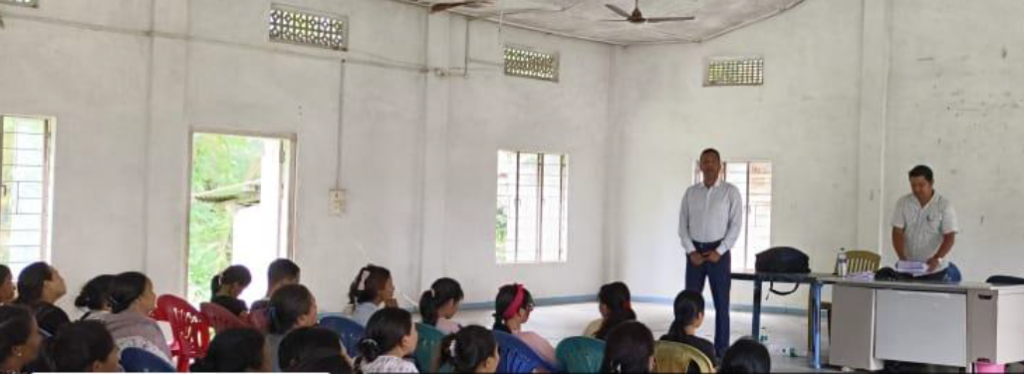
The RAMP program is a nationwide initiative by the Ministry of Micro, Small, and Medium Enterprises (MoMSME) with support from the World Bank. It aims to strengthen the MSME sector by:
•Enhancing credit access and financial resources.
•Providing guidance for sustainable and competitive business practices.
•Building resilience, especially in the wake of challenges like those posed by the COVID-19 pandemic.
MARCOFED’s Role in the RAMP Initiative
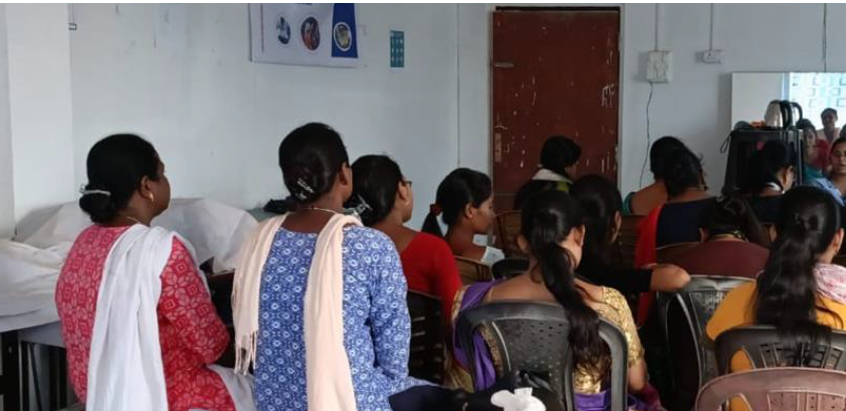
As a primary stakeholder, MARCOFED (The Nagaland State Co-operative Marketing & Consumers’ Federation Ltd.) serves as a bridge between the government’s vision for MSMEs and the local enterprises that form the backbone of Nagaland’s economy. MARCOFED’s involvement focuses on:
•Economic Upliftment: Supporting MSMEs in increasing revenue, accessing broader markets, and overcoming economic challenges unique to the region.
•Expanding Credit Access: Partnering with financial institutions to connect MSMEs with loans, grants, and funding opportunities tailored to small businesses, which often struggle to secure financing.
•Promoting Sustainable Business Practices: Encouraging MSMEs to adopt environmentally sustainable practices, modernize operations, and align with eco-friendly guidelines which benefit both the business and the environment.
Approach: Tailored, Community-Based Capacity Building
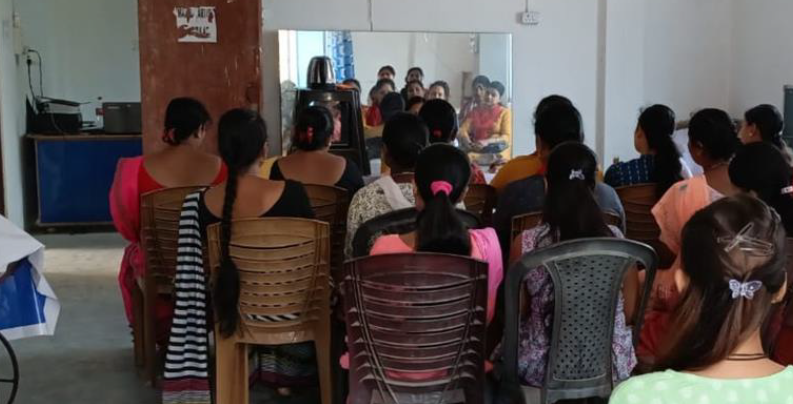
MARCOFED bridges government MSME initiatives and local businesses, offering community-based training, practical workshops, and tailored programs to boost MSME efficiency and resilience.
•Community-Based Training: Reaching MSMEs at the village and district levels, making training accessible and relevant to local needs. This includes working with existing community structures to ensure MSMEs receive support in familiar environments.
•Workshops: Hosting practical workshops on topics like financial literacy, digital marketing, resource management, and legal compliance. Workshops will blend theoretical knowledge with practical exercises, giving MSMEs actionable skills.
•Capacity-Building Programs: Developing tailored programs that address the distinct needs of various MSME sectors, from agriculture and food processing to handloom and handicrafts, focusing on improving efficiency, scalability, and resilience.
NIDC & RAMP Programme - Bird's-eye View
Partnership with NIDC to Implement RAMP Effectively in Nagaland
•Collaboration Focus: NIDC and MARCOFED leverage their strengths—NIDC’s expertise in industrial development and MARCOFED’s network in agricultural marketing—to create a robust platform for capacity building for MSMEs in Nagaland.
•Objective: To address unique MSME needs and foster a resilient ecosystem for local business growth.
NIDC’s Focus Areas
•MSME Performance Improvements: Training in business management, technology adoption, and financial and market access aims to boost MSME competitiveness and self-reliance.
•Environmental Sustainability: Focus on eco-friendly practices, waste management, and energy efficiency to align MSMEs with sustainability goals.
•MSME Resiliency: Risk management training and diversification support to help MSMEs withstand economic challenges.
NIDC’s Mission: Self-Sustained Growth for MSMEs
•Strategic Capacity Building: Hands-on training to equip MSMEs with skills for independent operation and sustainable scaling.
•Resource Access: Linking MSMEs with financial, technological, and market resources vital for growth.
•Direct Partnerships: Facilitating collaborations with financial bodies, government, and industry experts to create a supportive MSME network for long-term success.
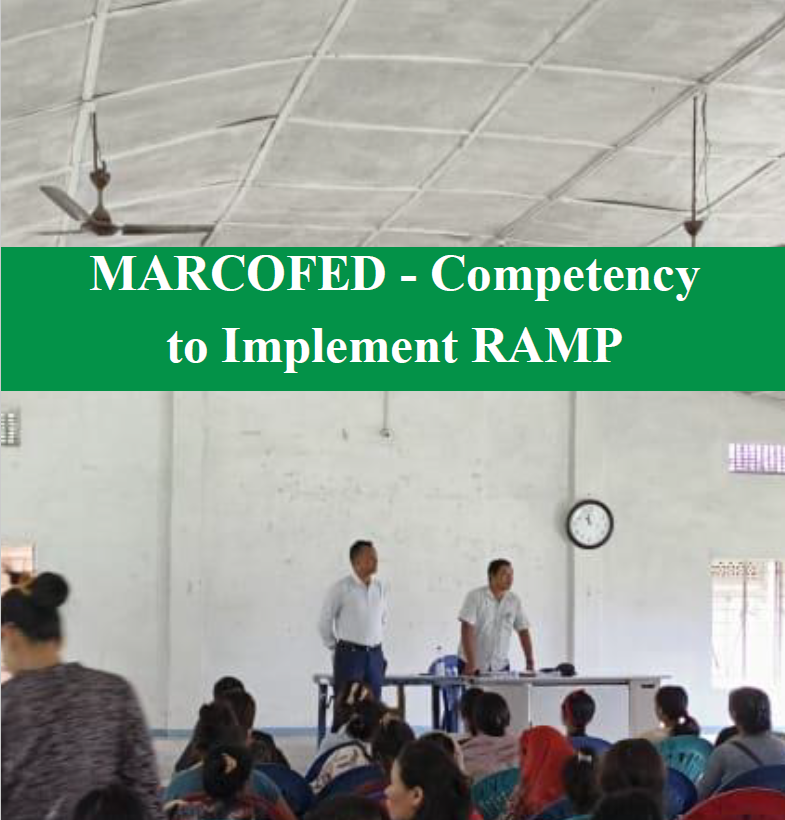
Entrepreneurship Training Excellence
MARCOFED has established itself as a premier institution in delivering comprehensive entrepreneurship training programs across diverse sectors. Our expertise spans agricultural enterprises, rural businesses, and cooperative societies, with a particular focus on MSME development. The organization has successfully conducted over numerous training sessions, impacting thousands of entrepreneurs across the Northeast region.
Key Achievements:
•Executed sector-specific training programs in agriculture, handicrafts, and food processing
•Developed customized modules for rural entrepreneurship development
•Implemented innovative teaching methodologies combining theoretical and practical approaches
•Created sustainable business models through intensive capacity-building initiatives
•Established monitoring frameworks to track training effectiveness
Robust Handholding Framework
The organization’s commitment to entrepreneur success extends beyond initial training through a structured handholding mechanism. MARCOFED’s dedicated team of mentors and industry experts provides continuous support to ensure business sustainability and growth. This approach has resulted in higher success rates among trained entrepreneurs.
Support Features:
•One-on-one mentoring sessions with industry experts
•Regular progress monitoring and performance evaluation
•Problem-solving assistance for operational challenges
•Market linkage facilitation and business networking support
•Technology adoption guidance and digital transformation assistance
Strategic Financial Linkages
MARCOFED has developed strong partnerships with various financial institutions, creating a robust ecosystem for entrepreneurial funding support. This network enables easy access to financial resources, crucial for business expansion and sustainability.
Financial Support Structure:
•Partnerships with major national and regional banks
•Collaboration with microfinance institutions
•Connections with government funding schemes
•Access to venture capital and angel investor networks
•Support for grant application and proposal development
Comprehensive Intellectual Resource Base
The organization has developed an extensive repository of intellectual resources tailored to MSME needs. These materials incorporate local context, market dynamics, and industry best practices, ensuring relevant and practical knowledge transfer. Resource Components:
•Detailed training manuals and workbooks
•Case studies featuring successful local entrepreneurs
•Sector-specific technical guides and references
•Business planning and financial management templates
•Marketing and digital presence development guides
Extensive Network Reach
MARCOFED’s widespread network spans across the Northeast region, connecting various stakeholders in the MSME ecosystem. This extensive reach enables effective program implementation and creates valuable opportunities for entrepreneurs.
Network Benefits:
•Access to market opportunities and business partnerships
•Connection with industry experts and successful entrepreneurs
•Participation in trade fairs and business exhibitions
•Integration with government initiatives and schemes
•Platform for cross-regional business expansion
MARCOFED’s Ramp Programme Objectives and Implementation Strategy
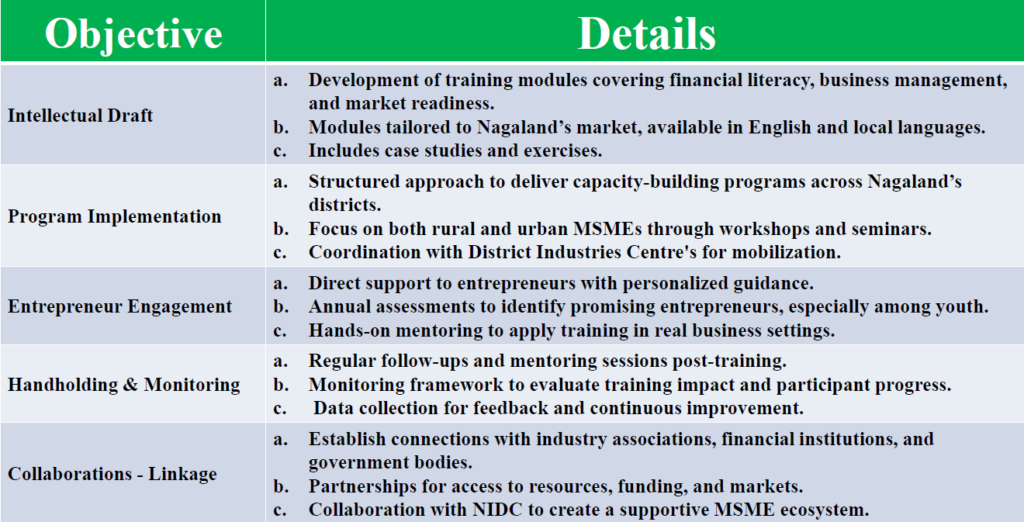
THREE YEAR ROAD MAP DISTRICTWISE INDUSTRIWISE BY CONSIDERING TIMLINES
1. Strategic Timeline & Vision We’ve crafted a dynamic three-year roadmap that progressively builds MSME capabilities in Nagaland:

2. Knowledge Development Framework Training
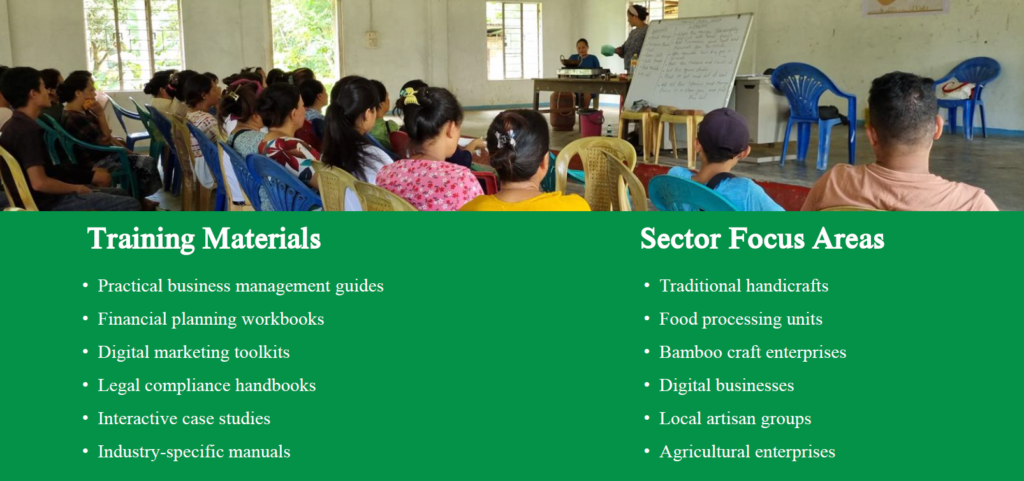
3. Implementation Infrastructure.
To effectively deliver the training programs, MARCOFED has established a robust Implementation Infrastructure. This includes strategically located district-level training venues, accessible training centers, modern learning facilities, and hands-on workshop spaces. Additionally, the program provides digital teaching tools, interactive materials, industry-specific equipment, and comprehensive reference libraries to ensure a dynamic and engaging learning experience.
4. Quality Assurance
Ensuring the quality and effectiveness of the training programs is a key priority for MARCOFED. The Quality Assurance framework includes regular progress assessments, participant feedback systems, training effectiveness metrics, and impactful evaluation reports. Furthermore, MARCOFED has implemented digital tracking systems, thorough progress documentation, successful case studies collection, and challenge identification processes to maintain a high level of data management and continuous improvement.
5. Continuous Support System
MARCOFED recognizes that the journey of entrepreneurship and small business development extends beyond the training programs. To this end, the Continuous Support System offers a three-year mentorship program, regular check-in sessions, problem-solving support, and growth planning assistance. Additionally, MARCOFED facilitates industry connections, including financial institution linkages, market access facilitation, government scheme integration, and supply chain partnerships to further empower and sustain the growth of its beneficiaries.
6. Global Market Preparation
Preparing entrepreneurs and small businesses for the global market is a crucial aspect of MARCOFED’s initiatives. The Global Market Preparation component focuses on export readiness, providing training on international standards, documentation procedures, quality control systems, global market research, logistics management, and packaging standards. This comprehensive approach aims to equip participants with the necessary knowledge and skills to successfully navigate and thrive in the global marketplace.
Outcomes & Conclusion
Quality Commitment:
MARCOFED’s commitment to quality is reflected in every aspect of its training programs. We deliver high-quality training modules that emphasize practical knowledge and real-world skills, ensuring participants can immediately apply what they learn to their businesses. Our content is thoughtfully customized to address the specific challenges faced by MSMEs in Nagaland, taking into account local market conditions, cultural contexts, and business environments. This tailored approach ensures that each participant receives relevant, actionable insights that drive sustainable growth and development.
Reaching Far and Wide:
The impact of MARCOFED’s RAMP program extends across the length and breadth of Nagaland. Our broad reach ensures that MSMEs from diverse communities and industries can access and benefit from our support systems. Whether in bustling urban centers or remote rural areas, our comprehensive training and mobilization efforts are designed to create a statewide impact. We believe in leaving no MSME behind, making our programs accessible to entrepreneurs regardless of their location or scale of operation.
Building Lasting Relationships:
At MARCOFED, we understand that true business transformation requires ongoing support and guidance. That’s why we focus on building lasting partnerships with our MSME participants, offering continuous mentorship and resources long after the initial training is complete. Our approach to relationship building extends beyond individual businesses – we actively foster a collaborative ecosystem where MSMEs, industry bodies, and government agencies work together. This interconnected network creates a supportive environment that promotes sustainable growth and development across Nagaland’s MSME sector.

